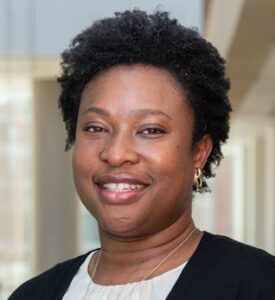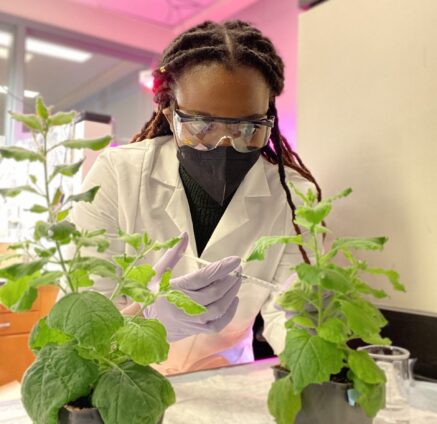Q&A with Dr. Eberechukwu Onukwugha: Understanding Decision-Making and Disparities in Health Care
November 9, 2021Dr. Ebere Onukwugha is a national leader in health economics and outcomes research, and is gaining attention for her efforts to address disparities in health care, an issue that is a priority for the PhRMA Foundation.

Eberechukwu Onukwugha, MS, PhD
Eberechukwu Onukwugha, MS, PhD, who received a PhRMA Foundation Postdoctoral Fellowship in Health Outcomes Research, is an Associate Professor in the Department of Pharmaceutical Health Services Research at the University of Maryland School of Pharmacy and is the Executive Director of the Pharmaceutical Research Computing Center at the University of Maryland School of Pharmacy.
Dr. Onukwugha is a national leader in health economics and outcomes research, and is gaining attention for her efforts to address disparities in health care – an issue that is a priority for the PhRMA Foundation.
She received a bachelor’s degree in economics and French from the University at Albany, State University of New York, a master’s degree in agricultural and applied economics, as well as a PhD in economics from Virginia Polytechnic Institute and State University (Virginia Tech). Dr. Onukwugha completed a two-year postdoctoral fellowship in pharmacoeconomics and health outcomes research at the University of Maryland School of Pharmacy.
In her work, Dr. Onukwugha examines the costs and health outcomes associated with health-related decisions as well as the institutional and environmental context framing individuals’ health-related decisions. The health-related decisions of interest include the decision to receive guideline-recommended treatment, self-care following a hospital discharge, and healthcare resource utilization in the oncology and cardiovascular disease settings.
Her research on cost-effectiveness and regression modeling has received Contributed Research Awards at international conferences sponsored by ISPOR, the Professional Society for Health Economics and Outcomes Research.
Dr. Onukwugha’s research has been published in journals such as Cancer, JCO Clinical Cancer Informatics, the Journal of Geriatric Oncology, PharmacoEconomics, Ethnicity & Disease, the Journal of General Internal Medicine, Neurology, Value in Health, and many others. She is an Editorial Board member for PharmacoEconomics and an associate editor for Ethnicity & Disease.
We recently asked Dr. Onukwugha to elaborate on aspects of her work and interests, including her efforts aimed at reducing health disparities:
How has the PhRMA Foundation fellowship impacted your career?
The PhRMA Foundation Postdoctoral Fellowship was the first grant that I received. As someone formally trained in a social science – in my case, economics – and not in the health sciences, I was initially unsure that my pan-disease focus on statistics, model testing and model interpretation would find a home. To be selected for a postdoctoral fellowship by leading researchers in health outcomes research communicated to me early in my career that pan-disease ideas were welcomed. Over the years, I have developed a focus area in oncology health services research. Within this area of study, I examine pan-tumor processes and outcomes, including multi-level factors and racial disparities in health care utilization across the cancer continuum.
You have continued your affiliation with the Foundation, serving as a member of the Health Outcomes Research Advisory Committee. Why did you decide to take on this role? What would you like people to know about the Foundation’s Health Outcomes Research fellowships?
I am honored to serve as a member of the Health Outcomes Research Advisory Committee. This service role provides an opportunity to give back to the research community and support a program that provides research funding at a critical point in the career of health outcomes researchers. A few years ago, the PhRMA Foundation made the decision to open its applications to non-U.S. citizens residing in the U.S. This decision recognized the diversity of our junior scientists already in the field and appears to have been well-received by the research community.
You have also been offering input and advice to the Foundation about its efforts to promote diversity. Tell us more about how you are helping and why this work is important.
Between 2019 and 2020, I served as a co-editor of an Ethnicity & Disease themed issue dedicated to health equity research conducted by early-stage investigators. My work on the journal’s themed issue, along with the Foundation’s longstanding interest in supporting junior researchers, generated conversations about systemic and structural barriers that disproportionately impact junior scientists who identify with a racial or ethnic minority group. The events of 2020 reiterated for me the need to take countable steps towards reducing barriers to success. To this end, I have been very pleased to contribute to the development of the Foundation’s Health Disparities Challenge Award and programs specifically designed to increase the role and contribution of under-represented individuals across the research ecosystem.
What are your views on the value of mentoring? Did you have mentors, and do you actively mentor others?
Mentoring is an opportunity to contribute to the life-long development of scientists by providing a listening ear, career advice or technical advice on the mentee’s scientific work. At its core, mentoring is support. I would not be where I am without the support of my past and current mentors – from my high school AP English teacher to my doctoral dissertation advisor to my current career mentors. In my faculty role, I mentor trainees – which include graduate students, PharmD students and high school students – who conduct health economics and outcomes research using a variety of databases. My mentees have gone on to secure faculty, research and fellowship positions. I also actively mentor junior faculty, providing advice on scholarship, teaching, and service activities.
What are your passions in life, and do you have any words of advice for young people considering careers in scientific research?
My passions in life energize me and add meaning to each day. These passions include helping others, learning new skills and putting my faith into practice. My goal is to experience one or all of these passions each day. My advice for young people considering careers in scientific research is to learn as much as you can about what it takes to succeed in your field. Take advantage of any career academies, internships or experiential rotations available through your institution. Along the way, embrace the hard work, seek out good mentors and look for ways to give back to your community.

